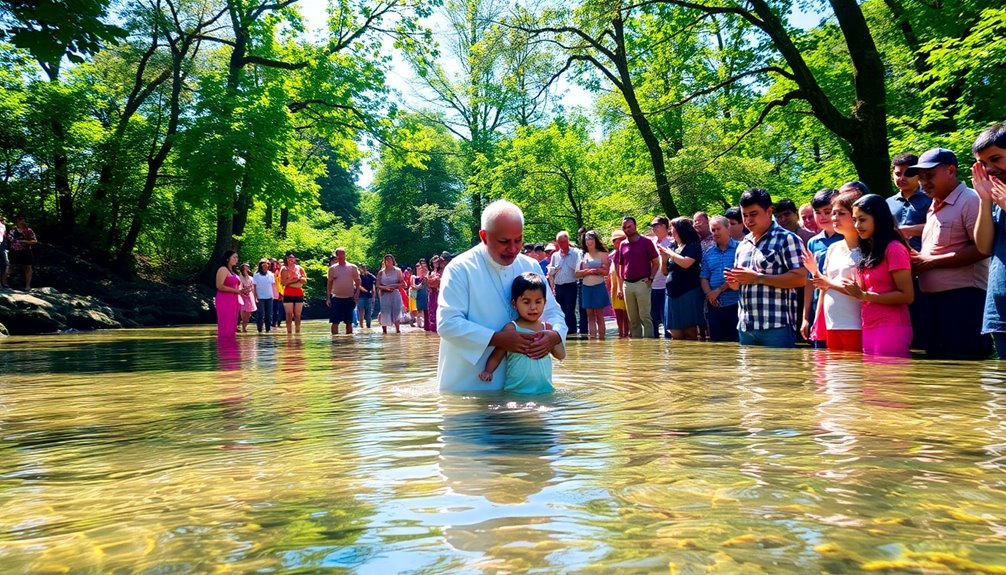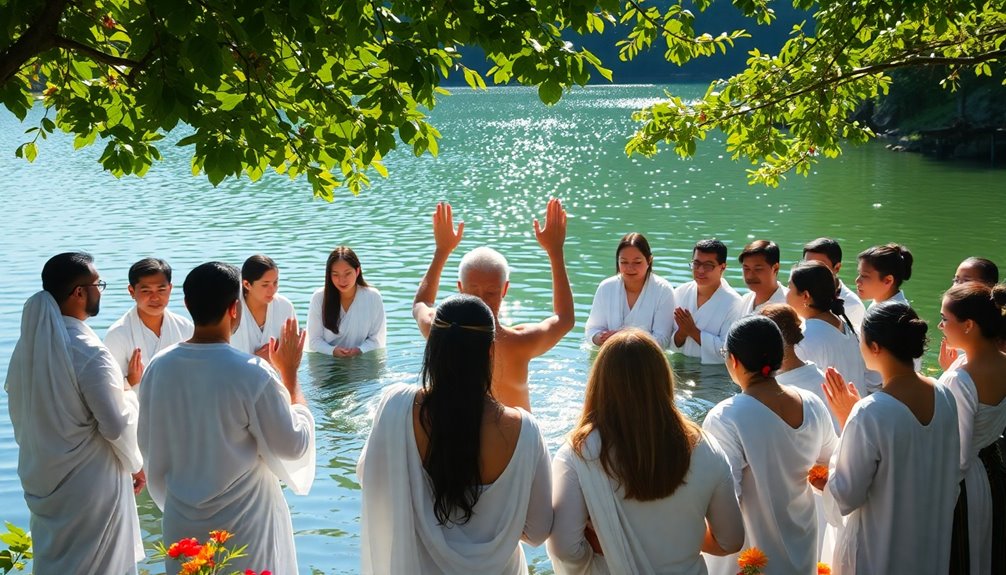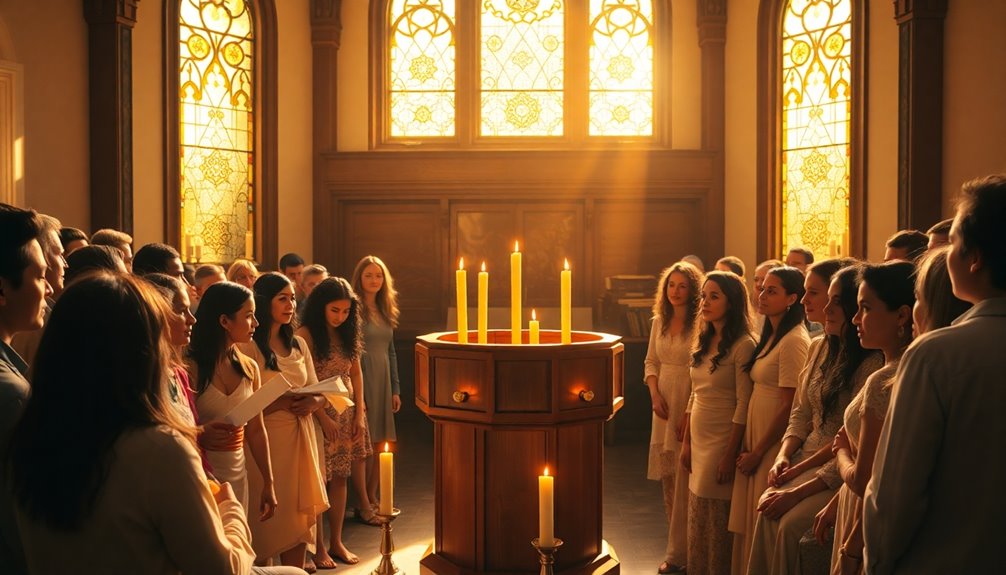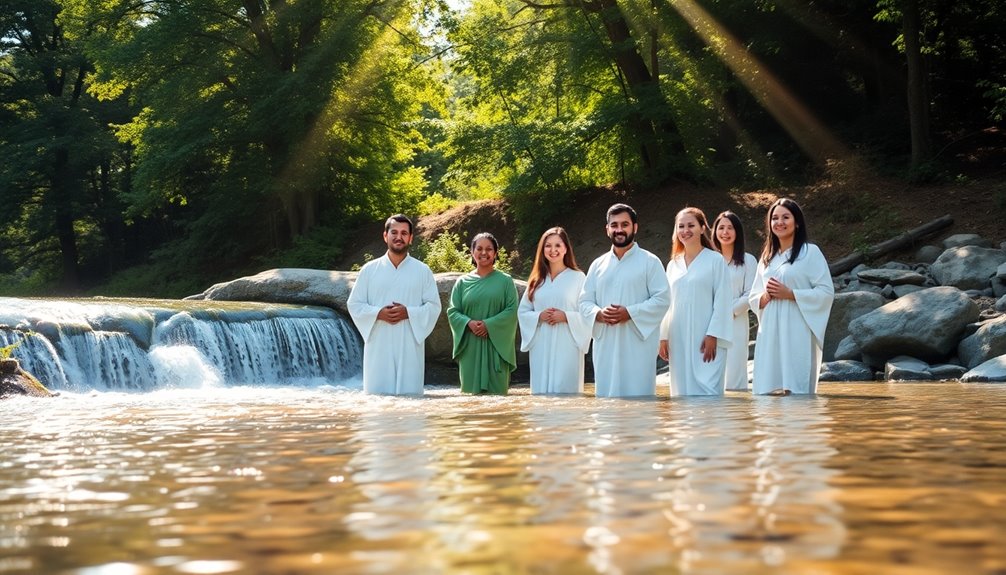Baptism is a crucial Christian sacrament that signifies your initiation into the faith, representing spiritual cleansing and renewal through water. Instituted by Jesus, it symbolizes your identification with His death and resurrection. It acts as a public declaration of your faith, connecting you to the Christian community. While different traditions interpret baptism in various ways, it remains essential in marking commitment and fostering social bonds within the faith. By understanding its historical and cultural context, you'd see how this transformative practice resonates with believers across generations and what it truly means for your spiritual journey.
Key Takeaways
- Baptism is a Christian sacrament symbolizing spiritual cleansing and initiation into the faith through water.
- It represents identification with Christ's death, burial, and resurrection, as instituted by Jesus in the Great Commission.
- Baptism serves as a public declaration of faith and commitment to the Christian community, uniting individuals into the Body of Christ.
- Early Christian practices included immersion, emphasizing the transformative power of baptism in various cultural contexts.
- Infant baptism is debated, with proponents viewing it as a means of grace, while critics emphasize the necessity of personal faith and repentance.
Introduction

Baptism is more than just a ritual; it's a vital step in your journey of faith. As a Christian sacrament, baptism represents your initiation into the faith, marking a significant moment of spiritual cleansing and renewal through water. Instituted by Jesus as part of the Great Commission, you're called to baptize in the name of the Father, Son, and Holy Spirit. This act signifies your identification with Christ's death, burial, and resurrection, symbolizing your transition from an old life of sin to a new life in Christ.
When you choose to be baptized, you make a public declaration of your faith and commitment to the Christian community. It emphasizes your obedience to Christ's teachings following your conversion.
Various methods of baptism exist, including immersion, affusion (pouring), and aspersion (sprinkling), but immersion is the most commonly practiced form among many denominations.
Ultimately, baptism serves as a powerful reminder of your identity as a believer and your commitment to live out your faith. It's not just a ceremony; it's an essential part of embracing your new life in Christ and fulfilling the call to share the Gospel with others.
Scriptural Basis for Baptism

When you explore the scriptural basis for baptism, you'll find that it's deeply rooted in key biblical passages.
Jesus' command in the Great Commission, along with teachings from Acts and Romans, highlights its significance in your faith journey.
Understanding these references can enrich your appreciation of baptism's role in your relationship with God.
Primary Bible References
The practice of baptism is deeply rooted in Scripture, providing a clear foundation for its importance in the Christian faith. In the Great Commission, Jesus commands His disciples to baptize all nations in the name of the Father, Son, and Holy Spirit (Matthew 28:19-20). This command highlights baptism as an essential act for believers.
In Acts 2:38, Peter connects baptism to the forgiveness of sins, emphasizing the necessity of repentance and faith in Jesus Christ. Romans 6:3-4 further explains baptism's significance, illustrating your identification with Christ's death and His resurrection, symbolizing your new life in Jesus.
Mark 16:15-16 reinforces this connection, stating that both belief and baptism are critical for salvation. This shows that faith in Jesus and baptism are intertwined in the process of redemption.
Finally, 1 Peter 3:21 compares baptism to Noah's ark, presenting it as a pledge of a clear conscience toward God. This highlights its role as a public profession of faith and a symbol of salvation through Jesus Christ.
Secondary Bible References
Scripture provides numerous secondary references that reinforce the significance of baptism in the life of a believer. In Matthew 3:13-17, you see Jesus baptized by John in the Jordan River, marking the beginning of His public ministry and setting an example for all believers.
Acts 2:38 highlights the importance of baptism, as Peter commands, "repent and be baptized, every one of you, in the name of Jesus Christ for the forgiveness of your sins." This emphasizes how baptism ties closely to repentance and the forgiveness of sins.
Romans 6:3-4 further illustrates baptism as an identification with Christ's death and a resurrection to new life, symbolizing the transformative power of salvation.
In 1 Peter 3:21, you find that "baptism now saves you," affirming its role in responding to God's grace.
Lastly, Galatians 3:27 reminds you that "all of you who were baptized into Christ have clothed yourselves with Christ," highlighting your new identity and unity within the Body of Christ.
Together, these references demonstrate how baptism is integral to your Christian faith and spiritual journey.
Early Christian Baptism Practices

Early Christian baptism practices emerged from Jewish purification rituals, serving as a powerful symbol of repentance and initiation into the faith community. In the New Testament, baptism was often performed immediately after a person's belief in Jesus, as seen in Acts 2:41 and Acts 8:12. This urgency highlights the importance of baptism as a public declaration of faith.
The predominant method of baptism among early Christians was immersion in water, which symbolized the believer's identification with Christ's death, burial, and resurrection. This practice differentiated Christian baptism from John's baptism of repentance, establishing a new spiritual significance. In Acts 19:1-7, the apostles emphasized this distinction, performing baptism in the name of the Father, Son, and Holy Spirit.
The Didache, an early Christian writing, provided guidelines for baptism, suggesting preferences for running water and recommending fasting before the ceremony.
These early Christian baptism practices not only underscored the commitment to Christ but also reinforced the sense of belonging within the faith community. By participating in baptism, you join a rich tradition that connects you to both the early believers and the core of Christian faith.
Historical Context of Baptism

Baptism's historical context reveals a rich tapestry of traditions and beliefs that shaped its significance in early Christianity. Its roots trace back to Jewish purification rituals practiced during the Second Temple Period, where water was essential for ritual cleansing before entering the temple.
John the Baptist introduced a transformative form of baptism, emphasizing repentance and preparing the way for the Christian sacrament. This marked a departure from earlier practices, highlighting a personal commitment to faith.
As the early Christian Church formed, baptism became a critical initiation rite, often performed immediately after a profession of faith, as seen in Acts 2:41 and Acts 8:35-36. This shift underscored the importance of baptism in the Christian community.
By the 3rd and 4th centuries, practices evolved to include catechetical instruction and additional rites, reflecting deeper theological insights.
The Apostle Paul further clarified the distinction between John's baptism of repentance and Christian baptism. He emphasized that true baptism occurs in the name of the Father, Son, and Holy Spirit, solidifying its central role in the faith.
This historical context reveals how baptism transitioned from ritual cleansing to a profound expression of faith and community.
Baptism's Significance Across Cultures

When you look at baptism across cultures, you'll find a rich tapestry of meanings and practices that often challenge common misconceptions.
For instance, doubts about infant baptism highlight the varying beliefs within Christianity about who should be initiated into the faith community.
Understanding these differences can deepen your appreciation for the transformative power that baptism holds worldwide.
Debunk Common Baptism Misconceptions
Across various cultures, misconceptions about baptism can obscure its true significance. Many people mistakenly believe baptism is a requirement for salvation, but it's primarily an outward declaration of your faith and commitment to Christ. This misunderstanding can lead to confusion about baptism's role in different traditions.
In Christianity, baptism symbolizes a personal belief rather than a ritual that guarantees salvation. Early Christians emphasized immersion, representing death and resurrection, while modern practices vary across Christian denominations, reflecting diverse theological interpretations.
Additionally, some non-Christian groups, like the Mandaeans, view baptism as a ritual for spiritual cleansing rather than an initiation into faith. This highlights how various cultures interpret baptism differently, often as a rite of purification similar to the Jewish mikvah.
Ultimately, baptism transcends social divisions, uniting individuals into the Body of Christ, as noted in 1 Corinthians 12:13.
Understanding these misconceptions can deepen your appreciation for the rich, multifaceted meaning of baptism in various contexts. Recognizing its significance helps you embrace the commitment it represents, fostering a more profound connection to your faith and community.
Doubts About Infant Baptism
Many people grapple with doubts about infant baptism, often questioning its necessity and validity. Critics typically argue that personal faith and repentance are essential prerequisites for this sacrament, emphasizing believer's baptism as the norm. They reference New Testament examples where individuals were baptized only after confessing their faith, leaving little scriptural support for infant baptism.
On the other hand, proponents cite covenant theology, which views infant baptism as a continuation of the Old Testament circumcision practice. This perspective argues that baptism signifies inclusion in the faith community from birth.
Furthermore, discussions around original sin support the idea that baptism acts as a means of grace, cleansing infants from this inherited sin. This belief is particularly strong in Catholic and Orthodox teachings.
Cultural variations also play a significant role in shaping opinions about infant baptism. In some communities, it's seen as a vital rite of passage, integrating children into the faith tradition and the family of believers.
Ultimately, whether you support or doubt infant baptism, understanding these differing views can deepen your appreciation for the diverse practices surrounding this important sacrament.
Baptismal Preparation Workshops

As you prepare for your baptism, reflecting on your personal faith journey can deepen your understanding of this important step.
Engaging with your congregation during this process not only strengthens your commitment but also fosters a supportive community around you.
Together, you'll explore what baptism means and how it publicly declares your faith.
Reflect on Personal Faith Journey
While navigating your faith journey, baptismal preparation workshops offer a valuable space to reflect on your personal beliefs and commitments.
These workshops guide you through the significance of baptism as a public declaration of your faith and commitment to Jesus Christ. You'll engage in discussions about the transformative power of baptism, understanding it symbolizes your death to sin and new life in Christ.
As you participate, you'll explore the biblical sequence of belief followed by baptism, emphasizing the importance of personal faith and readiness before this sacrament. Reflecting on your journey, you'll consider your understanding of sin and grace, and the commitment you're making to the Christian community through baptism.
These workshops also provide practical preparation, covering what to expect on the day of your baptism, including attire and the supportive role of the community in your new life as a believer.
Congregational Support and Involvement
Congregational support plays a vital role in the baptismal preparation process, fostering a community where candidates feel welcomed and informed. Through baptismal preparation workshops, you'll explore the significance of baptism and its theological implications within the Christian faith.
These workshops provide an opportunity to learn about the process of baptism and the importance of making a public commitment to your faith in Jesus Christ. You'll engage in discussions, ask questions, and connect with others in the community who are also preparing for baptism, creating a sense of belonging and support.
Many congregations offer valuable resources, like workbooks and informational pamphlets, to guide you through this preparation journey and deepen your understanding of the sacrament.
The involvement of church leaders and experienced members during these workshops is crucial. Their presence helps cultivate a welcoming environment, reinforcing the communal aspect of baptism as an initiation into the Body of Christ.
With their guidance and the support of fellow candidates, you can embrace this significant step in your faith journey, knowing you're part of a larger community that celebrates and supports your commitment.
Baptism's Cultural Significance Explored

What makes baptism such a powerful cultural rite of passage? For many in Christian communities, it symbolizes not just a personal faith commitment but also a formal entry into a larger community. This sacrament acts as a bridge, connecting you to shared beliefs and traditions that have been passed down through generations.
Baptism often involves communal meals and gatherings, where families come together to celebrate, reinforcing social bonds and a sense of belonging. During these events, you might witness unique rituals, like the gifting of a cross necklace or special clothing, which serve as lasting symbols of your newfound identity in the faith.
Different cultures also infuse their local practices into baptism ceremonies, enriching the experience while still honoring the core elements of the sacrament. This blend of traditions highlights the cultural significance of baptism, making it a deeply personal yet communal event.
Additional Resources

Numerous resources are available to help you deepen your understanding of baptism and its significance within the Christian faith. One essential source is the Catechism of the Catholic Church, which delves into the theological implications of baptism, emphasizing its role as a means of grace and necessity for salvation.
You might also explore "The Meaning of Baptism," a book that provides rich historical context and insights into the development of baptism throughout Christian history.
For those interested in the practices of baptism across different traditions, the Didache, an early Christian text, offers fascinating guidelines about the rite, including the use of running water and the requirement of fasting.
Furthermore, the World Council of Churches promotes ecumenism by highlighting the unifying significance of baptism among various Christian denominations.
Additionally, various online platforms, including church websites and theological resources, provide educational materials and classes. These can help you explore the significance, methods, and diverse practices of baptism.
Engaging with these resources will enrich your understanding of baptism's profound role within Christianity.
Frequently Asked Questions
What Is the True Meaning of Baptism?
The true meaning of baptism lies in its role as a powerful symbol of your commitment to faith.
It marks a significant transition, representing your choice to leave behind an old life and embrace a new one.
Through baptism, you publicly declare your belief in Jesus and your desire to follow Him.
It's a meaningful step that connects you to the Christian community, inviting you to engage actively in a life of faith and service.
What Is the Purpose of Baptism?
The purpose of baptism is to publicly declare your faith and commitment to follow Jesus Christ.
It symbolizes your new identity in Him, marking your entry into the Christian community.
Through baptism, you identify with Christ's death and resurrection, leaving behind your old self and embracing a new life.
It reminds you of the grace and forgiveness you've received, encouraging you to live according to God's will moving forward.
What Happens When You Get Baptized?
When you get baptized, you publicly express your faith and commitment to follow Jesus.
You usually undergo immersion in water, symbolizing your new life and connection to Christ's death and resurrection. This act signifies the forgiveness of your sins and marks your spiritual rebirth.
After baptism, you're welcomed into the Christian community, where you'll receive support and encouragement from others as you continue your faith journey.
Why Do Christians Get Re Baptized?
You might consider re-baptism if you've experienced a personal transformation or want to publicly reaffirm your faith.
Maybe your initial baptism didn't reflect your beliefs or happened when you were too young to understand its significance.
If you feel your first baptism didn't align with biblical teachings, especially regarding immersion after a confession of faith, re-baptism can symbolize your renewed commitment to living according to Christ's teachings and fulfilling His command.










